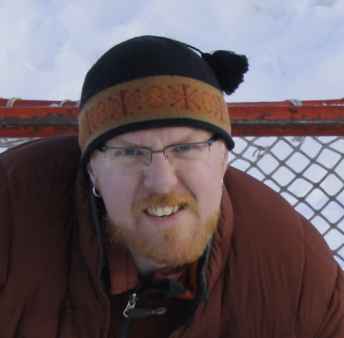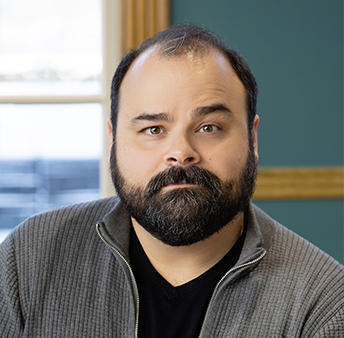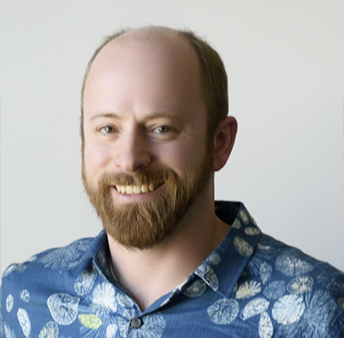| DAY 1 | THURSDAY, NOVEMBER 30, 2023 |
| 8:30 – 9:00 AM |
Registration |
| 8:45 – 9:00 AM |
Welcome: Dana Menendez
|
| 9:00 – 10:30 AM |
Keynote Speaker: Ethan Petticrew
Many schools across Alaska provide quality academic instruction, but fail to support students, engage families, or collaborate with community leaders and groups. This has created disparities across the state with populations outside of the mainstream. The current models of educational programming and design are based on historical experiences and ideologies that are often not conducive to a quality education for every child. These same practices keep certain communities from engaging in their schools. Educators and educational systems are often perceived as the “outsiders” that are bringing ideas, concepts, values, and even new standards into the community without the integration of local knowledge systems, practices, individuals, and groups. Instead of a community school, it becomes a school community that is estranged from the locals. Students from the fringe communities show little progress, if any, in these programs. Schools must examine themselves and make systemic changes if they are to break this cycle. See how an urban school made the transition from a standard western program with little parent engagement to one that is integrated with indigenous concepts from the foundation to the curriculum to the meal plans. Discover how this school engages families, students, and community members both in and out of the classroom. See how it has transformed parent participation and engagement through real life activities. This presentation will help in understanding the need for community engagement and the importance of providing supports for the whole child.
|
| 10:30 – 10:45 AM |
Break
|
| 10:45 – 11:45 AM |
Playing to Learn (Importance of Play in Education)

Peter Briggs
|

Rob Culbertson
|

Garrett Burtner
|
Play is a central and joyous part of life. Before we become official students, we are experts at investigating and exploring the world through our senses and imaginations in myriad forms of play. However, the experience of many students in formal education is divorced from the creativity, sociability, and spontaneity of play. Instead, education often focuses more on controlling behaviors and rewards obedience and conformity. In educational settings that do encourage play, there are many potential barriers for students with non-typical neurological or physical conditions.
Access to play begins at home. Play equity is an outcome of the barriers that any child must overcome to access the support and environments that facilitate play. Barriers can include parental or caregiver time to take children to play opportunities, social and community networks, the distance to these play opportunities, and how well a neighborhood is served by play. Schools may be the only guaranteed opportunity for children to engage in supported play. School play environments need to be provided and supported to facilitate cognitive, emotional, social, and physical development.
What is the value of play in the learning environment and how can we make valuable play opportunities available to everyone?
Learning Objectives:
- Reflect on their own experiences of learning through play, within and outside of school environments.
- Expand their knowledge of potential barriers to play, and how barriers can be removed or their influence minimized.
- Learn about strategies for creating more playful and therefore more engaging and memorable learning environments.
- Learn about current research linking play to measurable learning outcomes.
|
| 11:45 AM – 12:00 PM |
Vendors |
| 12:00 – 1:30 PM |
Lunch | Mat-Su Central – Trading Post for Learners
Nathan Clud, Carson Winell and Garrett Burtner
Mat-Su Central (MSC) is a public-school program within the Mat-Su Borough School District that supports 2200 home-taught K-12 students and their families. As a brick-and-mortar facility, they function as a kind of educational trading post where families can stock up on curriculum and supports, receive guidance and direct instruction, gather and socialize and then head back out on their learning journeys. MSC currently occupies leased space that they remodeled to suite the program. With enrollment quickly rising, MSC leadership, the School District and Borough set out in 2022 to design and build a new facility with the provocative descriptor; “Not a School”. The presenters will share experiences with and ideas surrounding the MSC program in a Q & A style discussion.
Learning Objectives:
- Learn how a public home-school hub facility functions.
- Learn how the planning process for the new MSC responded to the functional needs and vision of MSC as not-a-school.
- Learn about one former student’s experiences in this unique program and environment.
- Learn how one school district is adjusting their facilities to growing and shifting enrollment.
|
| 1:30 – 2:30 PM |
Community and School Use of Playground
Leah Boltz
Alaska built its first fully inclusive Boundless Playground in Anchorage in 2013. Over the last decade, Anchorage has brought inclusive play to 23 parks and counting, including the first indoor playground. As a result, more people have access to play, and neighborhoods are being activated in a positive way. Parks for All, a parent-led community initiative inspired by a group of Alaska students with disabilities, helped this community go beyond ADA compliance to embrace the inclusive play movement and change Alaska's playscape. What started as one project has grown into a strategic plan to make all playgrounds in the city inclusive. But we still have a long way to go. Parents, school staff, community leaders, educators, and students around the state are now taking the inclusive play movement to their own community schools, with the goal of giving ALL kids access to play, grow, learn, and thrive.
See the play environment from the perspective of a parent whose child experiences a disability, and explore design solutions that make our outdoor learning environments barrier-free and inclusive, with intentional outcomes for all students. Parks for All's founder, Leah Boltz, shares the story and lessons learned and leads an interactive dialogue on why and how we can all bring inclusive play to our schools.
|
| 2:30 – 3:00 PM |
Break
|
| 3:00 – 4:00 PM |
Chester Valley Through Time
John Weir, Nick Horn, Chris Woodward and Yuki Janson
Chester Valley Elementary School, initially built in 1964, underwent several phases of development to meet the evolving needs of its students and faculty. In 1967, a classroom addition was introduced, and a significant renovation took place in 2010, incorporating essential facilities such as a gymnasium, administration area, and kitchen. It has been over 13 years since the major renovation, and this year, Chester Valley successfully completed a secure vestibule project.
This panel aims to delve into the holistic perspective of Chester Valley's infrastructure, exploring the successes, adaptations, and durability of the design over the years. Attendees can expect a comprehensive discussion on the effectiveness of implemented changes, the enduring aspects of the initial design, and insights into how the school's architecture has stood the test of time.
Learning Objectives:
- Adapting Design to Unforeseen Changes in Education: Participants will gain an in-depth understanding of how architectural design can dynamically adapt to unforeseen changes and evolving trends in the field of education. Through case studies and real-world examples, the session will explore the flexibility inherent in well-designed educational spaces, emphasizing the importance of adaptability in the face of changing pedagogical needs.
- Positive Impacts of Future-Focused Planning: This session will delve into the positive impacts and lasting impressions that result from strategic planning for the future of educational spaces. Attendees will learn about the tangible benefits of forward-thinking design approaches, including improved functionality, enhanced learning environments, and the ability to accommodate future educational innovations.
- Key Considerations for School Renewal or Renovation Projects: Participants will acquire valuable insights into the key considerations and best practices when planning and designing school renewal or renovation projects. The session will cover aspects such as spatial planning, technological integration, sustainability, and creating spaces that foster collaboration and innovation.
- Community Engagement in the Design and Construction Process: Attendees will hear firsthand accounts of successful community engagement strategies implemented during the design and construction phases of a school renovation project. The session will highlight the importance of involving the community in decision-making processes, ensuring that the redesigned space aligns with the needs and aspirations of the local community.
|
| DAY 2 | FRIDAY, DECEMBER 1, 2023 |
| 8:30 – 9:00 AM |
Welcome Back: Dana Menendez
|
| 9:00 – 10:00 AM |
Neighbor Needs; Teacher Housing
LKSD and Dale Smythe
This session will explore the issues surrounding teacher housing in rural Alaska. The impacts of limited teacher housing on teacher hiring and retention. Limited lodging options for visiting staff and facility support effects on services and cost of work. Finally, the group will review current funding options, limitations and explore other solutions.
Learning Objectives:
- Gain insight into the challenges associated with teacher housing in rural Alaska, including the impact of limited housing options on teacher recruitment and retention.
- Explore how limited lodging options for visiting staff and facility support can affect the delivery of services, as well as the associated costs and implications for the overall educational environment.
- This program will provide an in-depth review of current funding options available for addressing teacher housing challenges. Participants will gain an understanding of existing limitations and potential barriers.
- Attendees will engage in discussions aimed at exploring innovative and alternative solutions to the teacher housing issue in rural Alaska. The session will encourage creative thinking to identify sustainable approaches to improve housing accessibility.
|
| 10:00 – 10:15 AM |
Break |
| 10:15 – 10:30 AM |
Vendors |
| 10:30 – 11:30 AM |
Early Childhood Learning Centers – Core to Community
Karen Zaccaro
In this session we will explore ways in which design can have resonating impacts to the benefits children gain from high quality early learning experiences. We will focus on an expanded notion of child centered design and dive into what design discussions can benefit children in early learning environments. Examples from lessons learned and views through the alternate lenses of child, educator, parent, and community member will illustrate facets of a wholistic direction. The discussion will include the impacts the facility can have on the health and well being of all occupants including staff and the efficacy of creating a safe, welcoming and nurturing space for children and educators. The session will include an overview of the relationship the child centered learning facility has with the broader community and how this engagement early on can lead to a more robust and sustainable Early Childhood Learning Center.
|
| 11:30 AM – 1:00 PM |
Lunch
Dana Menendez and Jason Swift
|
| 1:00 – 2:00 PM |
Chester Valley School Tour
An informative guided site tour of Chester Valley Elementary School, providing a comprehensive exploration of the school's facilities. The tour will offer in-depth discussions about the intricate designs and potential limitations of the existing infrastructure. Gain valuable insights into the architectural elements, spatial arrangements, and overall layout of Chester Valley Elementary School, offering a firsthand understanding of the school's physical environment. This immersive experience will allow participants to engage directly with the built environment, fostering a deeper appreciation for the school's design nuances and operational considerations.
Learning Objectives:
- Understanding Community Engagement in Education: Participants will gain insights into the importance of community engagement in educational settings, recognizing the impact of integrating local knowledge systems, practices, and community values into school programs.
- Exploring Indigenous Concepts in Education Design: Attendees will explore the successful transition of an urban school from a standard western program to one that seamlessly integrates indigenous concepts. This objective focuses on understanding how foundational aspects, curriculum, and even meal plans can be designed to reflect local culture and values.
- Transforming Parent Participation and Engagement: Participants will discover practical strategies employed by the school to transform parent participation and engagement. Real-life activities will be highlighted, showcasing how schools can go beyond traditional approaches to involve families, students, and community members.
- Recognizing the Need for Systemic Changes in Education: Attendees will gain awareness of the need for systemic changes in education to break the cycle of disparities and disconnect between schools and certain communities. The presentation emphasizes the importance of examining and reshaping educational systems to provide holistic support for the whole child.
|
| 2:00 – 2:30 PM |
Travel
|
| 2:30 – 4:00 PM |
Girdwood School Tour
The Girdwood School Tour offers participants a unique opportunity to explore the evolution and design considerations of Girdwood School. Originally constructed in 1981, the facility underwent addition in 1985 and a substantial expansion in 2015, with the latter renovation specifically aimed at accommodating students from kindergarten through eighth grade. Throughout the tour, attendees will witness firsthand how the design team collaboratively engaged with students, staff, and the community to create a space that fosters an optimal learning environment. The tour will delve into the intricacies of the design process, shedding light on how the physical layout and features of the school contribute to the educational experience for students. Participants can expect to gain valuable insights into the collaborative efforts that went into shaping the school's design, emphasizing the importance of community involvement and tailored solutions in educational infrastructure.
Learning Objectives:
- Design Collaboration and Community Engagement: Participants will explore how the design team collaborated with students, staff, and the community during the renovation of Girdwood School. Understanding the role of community engagement in the design process is essential for architects and educators seeking to create effective learning environments.
- Evolution of Educational Spaces: Attendees will gain insights into the evolution of Girdwood School's physical layout and features, specifically designed to accommodate students from kindergarten through eighth grade. This objective focuses on the importance of adaptable design to meet the changing needs of educational institutions.
- Tailoring Solutions for Educational Infrastructure: The tour will highlight how the design team tailored solutions to create an optimal learning environment. Participants will learn about the considerations and adjustments made to address the unique educational requirements of students in different grade levels.
- Integration of Community Values in Design: Participants will understand how the design of Girdwood School integrated local community values and knowledge systems. This objective emphasizes the importance of incorporating cultural and community-specific elements in educational architecture for a more inclusive and supportive environment.
|
| 4:00 – 6:00 PM |
Reception
Hosted by Nvision at 1600 A Street, Suite 300 |
| 6:30 – 7:00 PM |
Board Meeting |